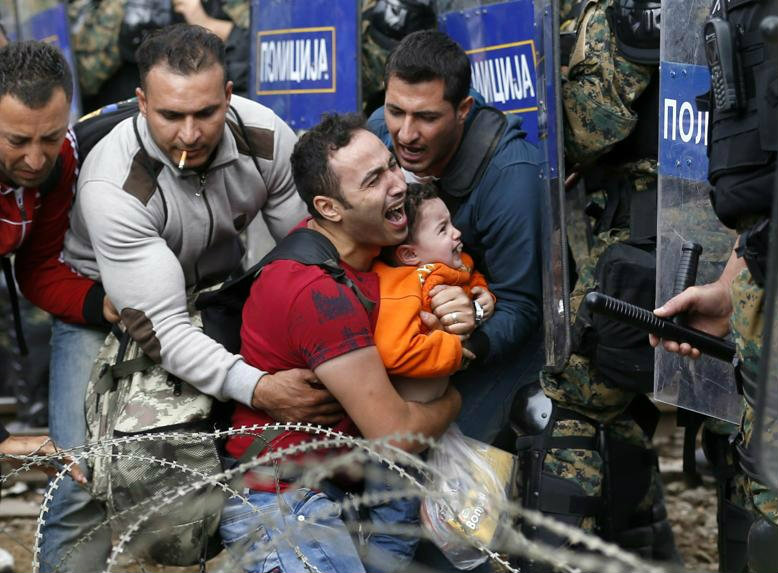Support strong Canadian climate journalism for 2025
Syrian refugees stepped off a plane at Toronto’s Pearson Airport to a warm welcome by none other than Prime Minister Justin Trudeau, who cheerfully snapped selfies with tired but happy new arrivals.
“This is a wonderful night, where we get to show not just a planeload of new Canadians what Canada’s all about, we get to show the world how to open our hearts and welcome in people who are fleeing extraordinarily difficult situations. Tonight they step off the plane as refugees but they walk out of this terminal as permanent residents of Canada,” said Trudeau.
The PM promised that Canada’s newest arrivals would enjoy all that Canadian permanent residency would offer, including healthcare and social insurance. Trudeau also promised that refugees would have the opportunity to become full Canadian citizens.
For the new arrivals, it marked a welcome end to a journey that started when Syria’s civil war erupted nearly five years ago. Since the war began, more than 250,000 people have been killed and four million refugees have fled to Lebanon, Jordan, and Turkey.
“You are home. Welcome home,” said Trudeau to one refugee family at Pearson Airport, as he posed with a little child and handed out a big winter jacket to her father. Joining the PM was Ontario Premier Kathleen Wynne, members of his cabinet, and federal opposition members.
Trudeau’s welcoming speech and impromptu airport meet and greet was the refugees’ first introduction to his government’s ‘Sunny Ways’ philosophy that is driving Ottawa’s plan to resettle 25,000 Syrians in Canada by early 2016.
“It’s our pleasure,” said Trudeau to another refugee family at Pearson.
"They're going back!"
Trudeau’s ‘Sunny Ways’ welcome for 25,000 Syrian refugees is the polar opposite of America’s Republican Party, whose leading figures have stoked fears over terrorists entering the United States.
Leading the charge against refugees is Republican presidential hopeful Donald Trump, who claimed in a speech that the Obama Administration wanted to take in 200,000 Syrians.
“If I win, they’re going back. They’re going back. I’m telling you, they’re going back,” Trump told cheering supporters two months ago in a speech recorded by C-SPAN.
Describing the supposed refugee influx as a “mass migration,” Trump told his audience that it would be a “200,000 man army,” entering America.

However, the U.S. has so far only accepted 2,174 Syrian refugees between 2012 and Nov. 19 of this year. The Obama Administration has committed to resettling an additional 10,000 refugees in America over the coming year.
Such a number will only represent about 0.004 per cent of America’s existing population of 318.9 million people. Canada, a country of 35 million people, is resettling 25,000 Syrians that represents roughly 0.071 per cent of its present population.
Even so, Trump claimed in another speech that Syrians entering the U.S. would serve as a “Trojan Horse,” for Islamic State terrorists to slip in and launch attacks on American soil.
In reality, Syrian refugees entering America must first undergo security screening carried out by the United Nations High Commissioner for Refugees. Next, they must submit to more checks conducted by officials from the State Department, FBI, Department of Homeland Security and the Defense Department. All told, the screening process can take as long as two years.
But Republicans continue to stoke fears over Syrian refugees regardless. As of last month, 31 state governors – of whom 30 are Republicans – have stated that they will not allow any refugees to reside in their states.
The governors made their announcement just days after the Paris terror attacks. One of the terrorists had a Syrian passport that was recovered from near his dead body. This revelation triggered security fears in both the U.S. and Europe over admitting refugees.
“Texas will not accept any Syrian refugees & I demand the U.S. act similarly. Security comes first,” tweeted Texas governor Greg Abbott last month.
However, law professor Stephen I. Vladeck told CNN that the U.S. Constitution entrusted the federal government with regulating entry of foreigners, not the states. What states can do is refuse to co-operate with Washington and complicate the federal government’s efforts to resettle refugees.
In Canada, refugees are free to live in whatever province or territory they wish, just like any other permanent resident.




Comments